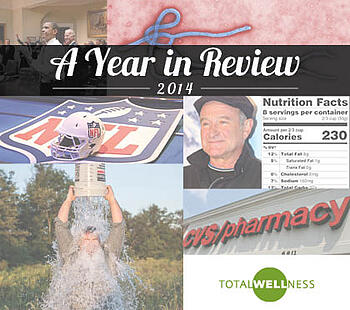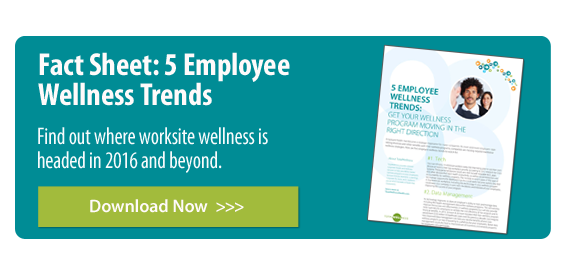As we near the end of another year, we tend to focus on what’s to come. As is true in the health and wellness world, every year brings new discoveries, movements, research and ideas. Let’s take a look backward and remember some of the major health events of 2014.

FDA Proposes Improved Nutrition Labels
This year, the FDA proposed changes to food Nutrition Facts labels to hopefully help consumers make better health decisions. According to the FDA, the new labels would include three primary features. First, the labels would contain information stemming from a greater understanding of nutritional science, meaning the information would not only be correct, but of utmost relevance to proven public health issues. Second, the labels would require updated serving size requirements to more accurately reflect the serving sizes typically consumed by Americans. Finally, the proposed labels would have a new and refreshed design to prominently promote important health information.
CVS Bans Tobacco Products
CVS Health pledged to stop selling cigarettes and all tobacco products at its 7600+ CVS/Pharmacy stores by Oct. 1, 2014. They cited the sale of tobacco products as inconsistent with their mission and values saying, “Cigarettes and tobacco products have no place in a setting where health care is delivered.” The chain held true to its word and then some, ceasing the sale of cigarettes and tobacco products a month early. It is yet to be seen whether this drastic decision will pay off for the company’s bottom line.
ACA Promotes Wellness Programs
The Affordable Care Act (ACA), often referred to as Obamacare, has played a role in a variety of healthcare reforms since its implementation. This year the ACA encouraged employers to offer wellness programs that include incentives for employees to embrace healthy habits. As of Jan. 1, 2014, companies can steer up to 30 percent of the total employees’ health insurance premiums towards incentives, plus up to 20 percent more to reduce tobacco use. But recent actions by the EEOC has caused anxiety and conflicting messages from the government about employer-sponsored wellness programs.
Ebola Reaches the U.S.
It’s no secret that the Ebola outbreak ravaging West Africa is a major health event of 2014. While the outbreak has been devastating in that region, its effects on American soil have been quite different. Even though the treatment of Ebola patients in the U.S. was controversial at times, the fact remains that our healthcare response, as well as the knowledge of Ebola Hemorrhagic Fever have improved because of it. The treatment and study of the disease in controlled settings allowed for:
- A better understanding of the course of the disease
- The opportunity to test potential vaccines
- The exposing of gaps in treatment, and therefore an improved treatment regimen
- Increased knowledge of and support for the disease allowing the U.S. to better assist in pandemic regions
Overall, the Ebola outbreak has been a major global health event. In our country alone, we’ve seen changes in practice and procedure stemming from the treatment of Ebola patients.
ALS Ice Bucket Challenge Raises Millions
ALS, often referred to as Lou Gehrig’s Disease, is a progressive disease that causes the degeneration of motor neurons. This causes individuals to lose control of muscle movement and eventually become paralyzed. The Ice Bucket Challenge is a fundraising effort to increase research about ALS. Participants record themselves being drenched with a bucket of ice water, make donations to various ALS foundations and call out specific friends on social media to do the same. The entertaining videos, competitive nature and mode of communication combined for the perfect viral video recipe. Challenges were completed by celebrities, politicians, teachers, students and anyone else with a bucket and smart phone. The ALS Association alone raised upwards of $115 million from the ALS Ice Bucket Challenge.
Robin Williams’ Death Sheds Light on Depression
On Monday, Aug. 11, 2014, the world lost comedic genius Robin Williams. The actor, though beloved by many, struggled with severe depression, eventually leading to his suicide. The sudden, tragic death of such an incredible actor and comedian sparked open conversation about depression in the U.S. This flood of public attention received by the topic of suicide and depression allowed a number of individuals to open up about their own personal struggles and take steps toward support and healing. The heartbreak opened doors and helped initiate a step towards eliminating the stigma associated with mental illness in our country.
NFL Incidents Spark Conversations About Domestic Violence
Similarly, tragic incidents involving NFL super stars shed light on the issue of domestic violence in the U.S. this year. The string of events stemmed from a video of Ray Rice, former running back for the Baltimore Ravens, hitting his then-fiancée, knocking her unconscious. This initial event sparked debate about domestic violence at the hands of professional athletes and the handling of that violence by league officials. The crisis has induced policy reviews by professional athletic organizations. It has also spread awareness of and support for the issue of domestic violence in the U.S.
As is true with every other year, 2014 has brought a great deal of health and wellness advances. These new discoveries, conversations, trends and ideas are what continue to provide the opportunity for health in America. What other major health events impacted you in 2014?



